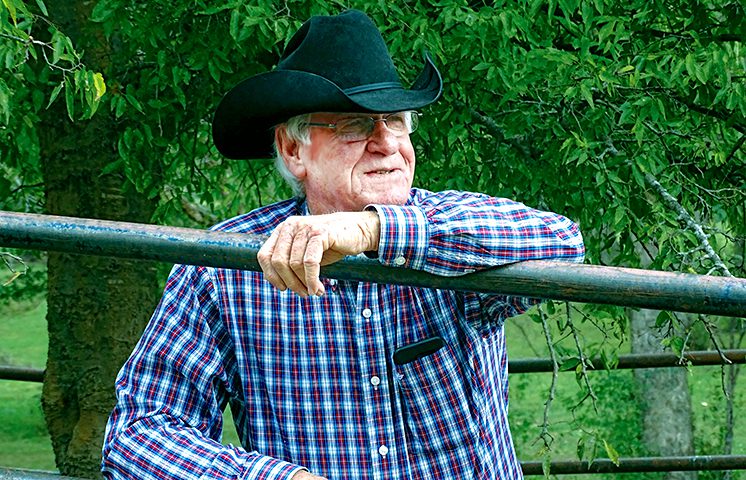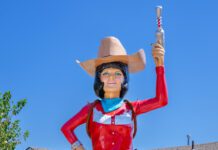For some years, at precisely 8:30 a.m., Claremore’s Ray Bingham has gotten a phone call from veteran country-music star Leroy Van Dyke, known for classic hits like “The Auctioneer” and “Walk on By.” With few exceptions, this happens every morning of Bingham’s life.
“I’ll get that call from Leroy no matter where he is,” Bingham says. “Now, if he’s out in the middle of Wyoming or something and doesn’t have any service, then he won’t be able to call. But that’s maybe one or two days out of the year.”
Bingham doesn’t remember how or why Van Dyke’s calls started, but that doesn’t matter as much as what they symbolize: his relationships with country-music artists he’s known and worked with the past six decades as a booking agent, producer and manager.
Most of those performers – including the soon-to-be nonagenarian Van Dyke, who still works 30-40 dates a year – have, like Bingham, logged many years in the business. All of them share a common element: Bingham likes them. Otherwise, he says, they wouldn’t work together.
“That’s what I’ve looked for in my life,” he says, “and I’ve been lucky enough to do that. Occasionally, I’ll buy someone new, and they won’t turn out to be a Gene Watson or a Moe Bandy, like I hoped they would.” He laughs. “But, for the most part, my job is a vacation. And I’ve got some nice people for friends.”
One of the earliest of those friends was the Tulsa-based steel-guitarist and bandleader Leon McAuliffe, who rose to fame as an early member of the trailblazing western-swing act Bob Wills and His Texas Playboys. By the time Bingham became acquainted with McAuliffe, he not only led his own swing band but also had his own dancehall, the Cimarron Ballroom at Fourth Street and Denver Avenue in Tulsa (now the site of a downtown bus depot).
From its beginnings in the late 1940s, the Cimarron had been the chief rival of the Cain’s Ballroom, home of McAuliffe’s old boss, Bob Wills. By the time Bingham came on the scene, Wills’ brother Johnnie Lee led the Cain’s band, and he and McAuliffe both drew big crowds to daily lunchtime radio shows at their respective venues.
“I think Johnnie Lee’s went off at 12:30, and then Leon’s came on,” Bingham says. “I had gotten out of the military and had a good job in Tulsa, but I just couldn’t stay away from the Cimarron. During the lunch hour, I’d run down to his broadcasts. So in 1960 or ’61, Leon gave me a part-time job, sweeping up and taking tickets and stuff, because I was there every day. I think he just wanted to find something for me to do.
“Rock ’n’ roll had kind of eaten up western swing at that time, so he’d begun playing Las Vegas, at the Golden Nugget and all these different places. Since he was gone a lot, he started letting me book acts at the Cimarron. So I booked Conway Twitty, Ray Price, Patsy Cline, Jim Reeves – a bunch of these acts. And I’m talking $500 and under for them during that period of time.”
As he got deeper into the business, he became acquainted with a young radio personality and country performer named Billy Parker, who helped him get a weekend gig at Tulsa’s KFMJ.
“I was probably the worst disc jockey ever on the air,” says Bingham, laughing again. “But thank God for Billy Parker. I owe everything to Billy Parker and Red Steagall.”
Like Parker, Steagall became a great friend of Bingham’s and started working with him professionally. That happened around 1973, after Bingham had been knocked out by Steagall’s hit western-swing version of “Somewhere My Love,” the theme song from the 1965 blockbuster movie Doctor Zhivago.
“I heard Red was going to be in Stillwater, so I headed up there to see him,” Bingham says. “Got there and his show was sold out. So I went around back to the bus. A guy was there named Wormy, who drove Red’s bus and sold his product. He was loading his cart to take it into the ballroom, and I said, ‘Look, I drove down here from Tulsa and they tell me it’s sold out. I need to get in there.’
“He said, ‘If you’ll help me sell product, I’ll get you in.’
“I said, ‘It’s a deal.’
“So I met Red that night after the show was over. And the next week I went to see him play in Oklahoma City because I had just fallen in love with his music. We started talking, and he said, ‘I’d sure love to play that Johnnie Lee Wills rodeo in Tulsa.’”
Bingham knew Johnnie Lee and he got Steagall the gig.
“Red and I have been hooked up ever since,” Bingham says. “We never did a contract because we never needed one.”
The same went for the other acts Bingham went on to represent over the years, including Parker, Peggy Rains, Becky Hobbs and the band Stonehorse. And those performers brought others into the Ray Bingham Productions stable, including a young singer Steagall had been helping along.
“Reba’s mother had asked Red to listen to the Singing McEntires, which was [siblings] Susie, Pake and Reba,” Bingham says. “It wasn’t that he didn’t see anything in the other two, but he just saw something special in Reba, maybe because she had red hair and he did, too. I don’t know. But he got her the Mercury [Records] deal, and she was using his band when he asked me to help book her.
“That worked out really, really well for me because after she got so popular and went on to have professional people handle her deal, I had all kinds of acts wanting me to book ’em. They thought I had something to do with Reba’s career, and I really didn’t. All I did was book her – sometimes for $250 a night.”
Another performer who came into Bingham’s orbit was a young man who, amazingly, ended up selling more records than McEntire.
“I really liked Garth Brooks as a person before I even knew he could sing,” Bingham says. “I’d booked his mother [country performer Coleen Carroll] with Billy Parker, years before, over at Jump’s Roller Rink in Fairfax, and Garth would always sit in with Stonehorse, or Red Steagall, when I’d have them in Stillwater.
“I booked him a lot. I’ve got all those contracts here on my desk, and I was looking through them one day when I found a letter from him thanking me for booking him on his first professional gig. I thought that was kind of neat. I’ve got it on the wall of my office.”
These days, with the help of his nephew Brett Bingham, Ray continues to supply country-music talent to a variety of venues, both in Oklahoma and surrounding states. He still gets plenty of work, even though the scene in his home state has gone through some big changes.
The biggest, he believes, is the death of dancehalls.
“Sherry Beard, who used to work for me, would have three to five dancehalls booked every weekend with local and national bands,” Bingham says. “It might be Durant or Drumright or Cushing, but every town in Oklahoma had a dancehall. That’s where we’d keep the up-and-coming acts, like Ronnie Dunn, working. And man, we looked forward to Monday morning, when all those cars drove up bringing us our commissions.”


























